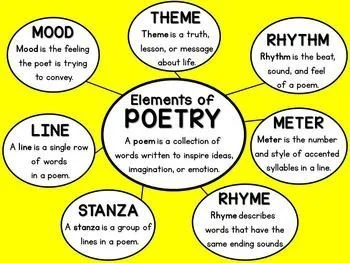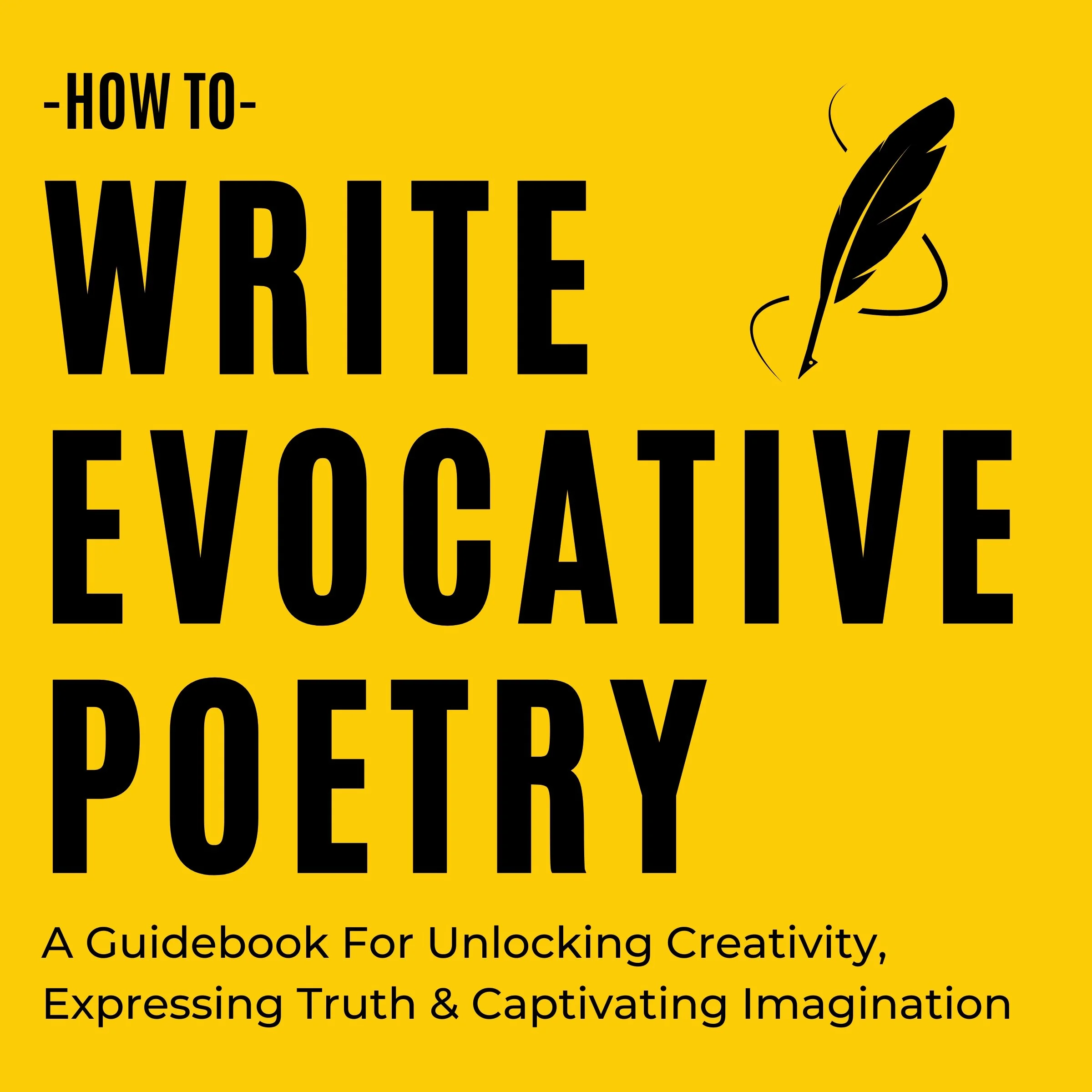Elements Of Poetry
What is poetry and what are the elements of poetry? Generally, in the many years that I’ve been writing poetry, I prefer to write with flow, from the heart, rather than worrying too much about what the elements of poetry are. However, it is useful to know the elements of poetry, and below I share a chapter from my book How To Write Evocative Poetry which goes into what is poetry, words as art, and how to write good poetry.
The elements of poetry are like the building blocks of each poem, they work together to evoke emotion, create rhythm, and convey meaning beyond the literal. Poetry weaves together several key elements to create meaning and musicality.
Lets have a look at some of the elements of poetry: The theme is the central idea or message of the poem, what it’s really about at its core, while the mood refers to the emotional atmosphere the poet creates, whether it’s sorrowful, joyful, tense, or reflective.
Rhythm is the flow of the poem’s language, shaped by the length and structure of each line, and often guided by meter, which is the measured pattern of stressed and unstressed syllables. Poets use stanzas, which are groups of lines, to organize their thoughts, create pauses, or signal shifts in tone or perspective.
Rhyme, whether traditional or subtle, can add musical quality and reinforce structure, helping to tie ideas together or highlight particular words. There’s also imagery, which paints vivid pictures through sensory language, and figurative language, such as metaphor, simile, and symbolism, as well as alliteration, which add layers of depth. Tone and voice reveal the poet’s attitude or emotional state
Together, these elements of poetry form the architecture of a poem, allowing emotion and meaning to resonate on multiple levels. Each one of the elements can be used deliberately and powerfully, allowing poetry to express what’s often hard to say in any other form.
But also remember, depending on the flow of a poem, you may only use some or none of any of the elements of poetry. Which leads us to the question, what is poetry anyway?
A chapter from How To Write Evocative Poetry
What Is Poetry?
Poetry is just words on a page.
Anything beyond that definition risks falling into a philosophical or literary debate that would amount to such an abstraction of the beauty of the artform as to render it pointless. There are no rules. No restrictions. No limits to what you can and can’t, or to what you should and shouldn’t do. A lot of this book will help you to hone that expression, giving you tips, tools, and tricks to make it more evocative. But that is all just make up and window dressing. Expression is the key. Some people gravitate towards rhymes and structure, others to free-flowing verse, others still, to long form paragraphs or books, crafting each line with meticulous care. It is all just writing. It is all just words on a page. It is all just poetry.
Sometimes you won’t know what kind of writing is coming. Is it a poem, a podcast script, a blog, or a book? Maybe it’s something else entirely, like a painting or dance. Time and practice will give you an intuitive sense of what it is and how to proceed. Consider No Longer Able To Swim, it could easily have been written as a short story, hitting similar beats and symbolism – but it landed as a poem.
No Longer Able To Swim
Overwhelmed
By the responsibilities
I volunteered for
Way back when
I believed
Now I see
That a life raft
Can become a stone
All it takes
Is one hole
And everything sinks
I am no longer able to swim
Weighed down
By all the things
That were supposed
To help me
Survive
Using Words As Art
Poetry is the art of using words as art, shaping language with intention, emotion, and rhythm to create something that resonates far beyond its literal meaning. Unlike ordinary speech or writing, poetry distills experience, feeling, and imagery into carefully chosen lines that speak to both the heart and the mind.
Through elements of poetry like metaphor, mood, and musicality, poets transform simple phrases into powerful expressions of the human condition. Whether structured or free-flowing, poetry invites us to see the world differently, proving that words, when used with care, can be as expressive and moving as any painting, song, or sculpture. Using words as art is my favorite type of art!
If I was instead to have applied the tools, tips, and tricks of short fiction, perhaps it would have been expressed differently, or perhaps I am just in a poetry phase. The point is that an idea can be expressed in multiple formats, multiple times, but I have found that getting it down in its purest form, at least initially, leads to the best version of expression, and from there you can play.
Consider the first few paragraphs of this section. They came to me in the above format, but with some tweaking, line breaks, and other applications of the tools from this book, perhaps a poem will form. Let’s have a quick play with using words as art…
just words on a page
poetry
just words on a page
anything more
is an abstraction
just a pointless debate
attempting to pin down the impossible
there are no rules
there are no restrictions
there are no requirements
beyond
just words on a page
Clearly not my best work, and I didn’t spend much time on it, but that kind of proves my point. The feelings conveyed in the poem, to me at least, are better expressed in the longer format above. What’s more, that is the format that I was inspired to write in, thus the full force of my care and application of creativity and technical prowess was brought to bear upon the former, but I lacked such desire for the latter. The point is, write the words down, as they come, and then play. Perhaps you are writing a poem, perhaps not. Either way, just write.
Broadly speaking, there are two different types of poetry: ‘free form’ and ‘structured’. As the name suggests, free form is free, the poet is not limited to any rules, structure, or restrictions other than those they impose upon themselves. On the other hand, structured poetry has a predetermined set of rules in which the poet needs to work towards for their piece to be deemed acceptable; think of the limitations contained within the ABAB, haiku, monorhyme, sonnet, limerick, acrostic, etc. People get very finicky in the debate over these definitions, arguing endlessly about whether a certain poem meets the criteria of a particular type of poetry. To me this is all mute. I do not care if a poem fits a definition or not. I just care if it moves me (I am more artist than scholar!).
In my opinion, there is no best way to write poetry and no best type. I encourage you to play with every variation of form that appeals to you, and even those that don’t, this will help you to discover the intersection between what you enjoy writing and what you are good at writing. Practice makes perfect so work on your craft.
How To Write Good Poetry
Figuring out how to write good poetry starts with honesty and attention. Begin by tapping into real emotions or ideas that matter to you, authenticity gives poetry its power. Pay close attention to word choice, imagery, and rhythm; every word should carry weight.
Use elements of poetry like metaphor, simile, and repetition to deepen meaning and evoke feeling if you want to, or just try to write as a flow. Reading your work aloud to hear its flow and refine the sound will help you learn how to write good poetry.
Good poetry doesn’t have to rhyme or follow strict rules, but it should connect with the reader, emotionally, visually, or intellectually. Most importantly, practice often, read widely, and let your unique voice guide the way.
This book is not going to give you a guide to the specific technicities of a Shakespearian Sonnet or other traditional forms of poetry. There are far better resources available for that, see Part 6: Resources. In this book, I will not go into quatrains or how to ensure that you are following the iambic pentameter perfectly.
I will not talk about the issues of translation that cause the traditional 5,7,5 syllable haiku structure to be questioned when writing in English, nor will I spend much time worrying about if a poem should be considered an ode, villanelle, or a limerick. Instead, the focus will be on making your poetry, however you choose to write it, evocative. We will focus on how to write good poetry.
A poignant example of a freeform poem that moved both myself and my audience was this morning i woke. Written as a kind of narrative, this poem inspired countless comments and messages – some of concern, but vastly more sharing a resonance with the themes of Lovecraftian horror that the concept of a scary ‘nothingness’ evokes. This poem has no structure, and was largely written off the cuff, with only minor edits to eliminate superfluous words and to sure up some other hanging sentences.
this morning i woke
this morning i woke
terrified of nothing
my anxiety already overworking itself
working me up to a state of near panic
i tried remembering that i am safe
it didn’t help
i tried breathing slowly
but i couldn’t
so my body tried to vomit out the non-existent toxins of which it believed itself afflicted
i doubled over
i fell to my to my knees
and expelled everything
and in the slight pause
between the release
and the wiping of the mess off my beard
i had moment of reflection
i began to laugh
how silly i thought
to be so afraid of nothing
how ridiculous is my anxiety!
what a joke!
looking down at last nights dinner
i felt empowered
but that empowerment was quickly quashed
a dead weight in the depths of my gut began to form
a weight so heavy that even the most adamant
of retching couldn’t dislodge
the laughter ended
new thoughts replaced old
and i realised
that true nothingness
is beyond terrifying
that the opposite of fear isn’t calm
the opposite of sadness isn’t happiness
the opposite of hate isn’t love
no
the opposite of all of those things
the opposite of everything
is a nothingness so vast
so all encompassing
that i couldn’t comprehend a merest portion
awed by the paradoxical size of the nothingness
i wept
but then i laughed once more
for that weight in my gut
and the sheer terror that it evoked
told me
that for now at least
i am living on the opposite side of the nothingness
my anxiety is right
i should be afraid
but i should also
be grateful of the fact
that i can wake
terrified
vomiting
and unable
to slowly
breathe
Would this morning i woke have been more powerful if it were altered it to fit a specific structure? Personally, I don’t think so. When choosing between writing a free form or structured poem, I generally go with the choice that will result in the most evocative poem, and I invite you to do the same.

